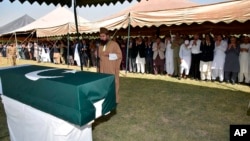Final prayers were offered Tuesday in Karachi for Pervez Musharraf, Pakistan’s late president and military ruler.
The service at the grounds of a military complex took place hours after Musharraf’s body was flown by a special jet to the southern port city from Dubai, where he and his family spent his final years in self-imposed exile. Among those in attendance were former military chiefs Qamar Javed Bajwa, Ashfaq Parvez Kayani and Aslam Beg.
Current Prime Minister Shehbaz Sharif did not attend, but issued a message of condolence on Twitter: “I offer my condolences to the family of General (rtd) Pervez Musharraf. May the departed soul rest in peace!”
Musharraf was laid to rest in a military graveyard in Karachi.
The 79-year-old Musharraf died Sunday in Dubai from amyloidosis, a rare disease in which an abnormal protein builds up in organs, causing them to malfunction. He came to power in October 1999 after overthrowing democratically elected Prime Minister Nawaz Sharif, the current prime minister’s brother, in a bloodless coup.
His efforts to root out corruption initially won him widespread popular support, which grew as Pakistan’s economy flourished on the back of foreign assistance that the country received for supporting the U.S.-led coalition in Afghanistan that toppled the ruling Taliban in response to the September 11, 2001 attacks on New York and Washington. But his support of the U.S. grew increasingly unpopular as Pakistan suffered a rise in militancy and terrorism from local groups that supported the Afghan Taliban.
As his rule went on, major political parties remained suppressed, thousands of political opponents were arrested, and the freedom of the media and judiciary was curbed.
The assassination of former Prime Minister Benazir Bhutto in 2007, and his suspension of Pakistan’s constitution that same year, further eroded Musharraf’s political standing. He resigned as president in 2008 and left Pakistan the next year.
Musharraf was tried in absentia for treason in 2013 and sentenced to death six years later. The punishment was struck down in 2020.
Some information for this report came from Agence France-Presse and reporting by Ayaz Gul in Islamabad.





